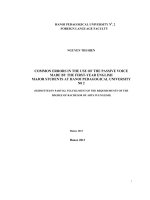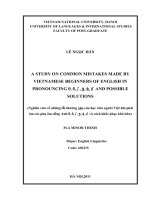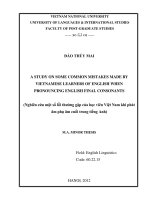Correct your english errors avoid 99% of the common mistakes made by learners of english
Bạn đang xem bản rút gọn của tài liệu. Xem và tải ngay bản đầy đủ của tài liệu tại đây (0 B, 0 trang )
Copyright©2009byTimCollins.Allrightsreserved.ExceptaspermittedundertheUnited
StatesCopyrightActof1976,nopartofthispublicationmaybereproducedordistributedinany
formorbyanymeans,orstoredinadatabaseorretrievalsystem,withoutthepriorwritten
permissionofthepublisher.
ISBN:978-0-07-183066-9
MHID:0-07-183066-9
ThematerialinthiseBookalsoappearsintheprintversionofthistitle:ISBN:978-0-07147050-6,MHID:0-07-147050-6.
Alltrademarksaretrademarksoftheirrespectiveowners.Ratherthanputatrademarksymbol
aftereveryoccurrenceofatrademarkedname,weusenamesinaneditorialfashiononly,andto
thebenefitofthetrademarkowner,withnointentionofinfringementofthetrademark.Wheresuch
designationsappearinthisbook,theyhavebeenprintedwithinitialcaps.
McGraw-HilleBooksareavailableatspecialquantitydiscountstouseaspremiumsandsales
promotions,orforuseincorporatetrainingprograms.Tocontactarepresentativepleasee-mail
usat
TERMSOFUSE
ThisisacopyrightedworkandTheMcGraw-HillCompanies,Inc.(“McGraw-Hill”)andits
licensorsreserveallrightsinandtothework.Useofthisworkissubjecttotheseterms.Except
aspermittedundertheCopyrightActof1976andtherighttostoreandretrieveonecopyofthe
work,youmaynotdecompile,disassemble,reverseengineer,reproduce,modify,create
derivativeworksbasedupon,transmit,distribute,disseminate,sell,publishorsublicensethe
workoranypartofitwithoutMcGraw-Hill’spriorconsent.Youmayusetheworkforyourown
noncommercialandpersonaluse;anyotheruseoftheworkisstrictlyprohibited.Yourrighttouse
theworkmaybeterminatedifyoufailtocomplywiththeseterms.
THEWORKISPROVIDED“ASIS.”McGraw-HillANDITSLICENSORSMAKENO
GUARANTEESORWARRANTIESASTOTHEACCURACY,ADEQUACYOR
COMPLETENESSOFORRESULTSTOBEOBTAINEDFROMUSINGTHEWORK,
INCLUDINGANYINFORMATIONTHATCANBEACCESSEDTHROUGHTHEWORKVIA
HYPERLINKOROTHERWISE,ANDEXPRESSLYDISCLAIMANYWARRANTY,EXPRESS
ORIMPLIED,INCLUDINGBUTNOTLIMITEDTOIMPLIEDWARRANTIESOF
MERCHANTABILITYORFITNESSFORAPARTICULARPURPOSE.McGraw-Hillandits
licensorsdonotwarrantorguaranteethatthefunctionscontainedintheworkwillmeetyour
requirementsorthatitsoperationwillbeuninterruptedorerrorfree.NeitherMcGraw-Hillnor
itslicensorsshallbeliabletoyouoranyoneelseforanyinaccuracy,errororomission,
regardlessofcause,intheworkorforanydamagesresultingtherefrom.McGraw-Hillhasno
responsibilityforthecontentofanyinformationaccessedthroughthework.Underno
circumstancesshallMcGraw-Hilland/oritslicensorsbeliableforanyindirect,incidental,
special,punitive,consequentialorsimilardamagesthatresultfromtheuseoforinabilitytouse
thework,evenifanyofthemhasbeenadvisedofthepossibilityofsuchdamages.Thislimitation
ofliabilityshallapplytoanyclaimorcausewhatsoeverwhethersuchclaimorcausearisesin
contract,tortorotherwise.
CONTENTS
Introduction
Acknowledgments
PronunciationandSpelling
Pronunciation
Spelling
Capitalization
Punctuation
Grammar
Nouns
Numbers
Determiners
Pronouns
Adjectives
PossessiveWords
Verbs
Be:SimplePresentTense
SimplePresentTense
PresentProgressiveTense
Imperatives
Be:SimplePastTense
SimplePastTense
PastProgressiveTense
PresentPerfectTense
FutureTensewithGoingtoandWill
ModalVerbs
Subject-VerbAgreement
PassiveVoice
Two-WordVerbs
ReflexiveandReciprocalVerbs
Infinitives,Gerunds,andParticiples
Adverbs
Prepositions
ConditionalSentences
ImpersonalExpressions
Vocabulary
CatchtheErrors
IrregularVerbList
AnswerKey
IndexofWordsandExpressions
SubjectIndex
INTRODUCTION
ThepurposeofthisbookistoidentifythemostcommontroublespotsforEnglishlanguage
learners,toprovideabasisforunderstandingwhythesetroublespotscausedifficulties,andto
offerguidanceandpracticeforavoidingpotentialerrors.
Manyerrorscommonlymadebyspeakersandlearnersofasecondlanguagearecausedby
transferringpatternsandfeaturesofthenativelanguagetothenewlanguage.Thishappensinall
aspectsoflanguagefrompronunciationtowordformationtosentencestructure:
DifficultysayinganEnglishsoundarisesbecausethefirstlanguagedoesnothavesuchasound.
DoublelettersareomittedfromEnglishwordsbecausethefirstlanguage’sspellingsystem
doesnothavedoubleletters.
Verbendingstoshowtenseornounendingstoshowpluralsareomittedbecausethefirst
languagedoesnotaddsuchsuffixestothesewords.
Adjectivesareplacedafter,ratherthanbefore,nounsbecausethefirstlanguagefollowsthat
pattern.
“Tallerfrom”issaidinsteadof“tallerthan”becausethat’sthepatterninthefirstlanguage.
Anothersourceoferroristhelearningprocessitself.Thatis,learnerstendtooverapplyor
misapplypatternsandrulesinthenewlanguage,donotlearnexceptionstotherules,ordonot
applytherulesfully.Hereareexamplesofthesekindsoferrors:
Applyingtheregular-edpast-tenseendingtoirregularverbs:Igoedhomeearlyyesterday.
Usingmorewiththeadjectiveheavy(whichrequiresthe-erending)becausetherulethattwosyllableadjectivesendingin-yuse-er,notmore,wasnotfullylearned.
Usingasleepinfrontofanounbecausetherulethatacertainsmallgroupofadjectives,
includingasleep,areusedonlyafteralinkingverbwasnotfullylearned.
Inthisbook,youwillfindhelpwiththeseandmanymorecommonerrorsthroughexplanationand
example.Youwillbecomeawareofpotentialtroublespotsandlearnhowtobreakthehabits,
learnthenecessaryrules,andcorrectyourmistakes.Severalexamplesaregivenforeachtopic,
followedbyexercisesthattestyourunderstandingandhelpyouavoidthepitfalls.
Becauseindividualwordsofalanguageareusedinconnectionwithotherwords,youwillfind
thatmanytopicsarementionedinmorethanoneplace.Extensivecross-referencingwillhelpyou
findconnectionsbetweenrelatedtopics.Topicsandlistsarepresentedinlogicalorder.For
example,irregularverbsarepresentedingroupsofverbsthatfollowsimilarpatterns.
Comparativeandsuperlativeformsofadjectivesarepresentedinlogicalgroupingsaccordingto
howtheyareformedandspelled.Verbtensesarepresentedinorderfromthepresenttenseto
modalverbs.Complexsyntacticpatterns,suchasthepassivevoice,arepresentedattheendof
thevolume,afteralltheprerequisiteknowledgehasbeenpresented.Inaddition,thebackofthe
bookincludesacomprehensiveanddetailedindex,whichservesasaguidetolocatingallthe
referencestoeachtopic,aswellasakeywiththeanswerstoalltheexercises.Ihopethatthe
materialspresentedinthisbookwillhelpyouimproveyourproficiencyinEnglishandavoidthe
mostcommonandvexingerrorsinEnglish.
SuggestionsforUsingthisBook
Thisbookisdividedintotwoparts:PronunciationandSpellingandGrammar.Thelargest
sectionisGrammar,whichidentifiesthevariouspartsofspeechintraditionalterminologyfor
easeofcomprehension.Eachtermisexplainedandillustratedwithmultipleexamples,providing
necessaryrevieworclarification.
Therearemanywaystousethisbook:
Examinethe“AvoidtheError”headingsineachsection.Readtheexamplesandthenthe
relatedexplanations.
Usetheindextofindspecifictopics,asyouneedthem.
Usethetableofcontentstofindthespecificchaptersyouwanttostudy.
Workthroughthebookinsequencefrombeginningtoendforacompleteovervieworreview
ofEnglishgrammarandthemostcommonandvexingerrorsthatlearnersmake.
Completetheexercisesonyourownpaper,andusetheAnswerKeytocheckyourwork.Then
reviewanyareaswhereyouneedextrarevieworexplanation,andcompletetheexercisesagain.
Usethe“CatchtheErrors”sectionattheendofthebooktocheckyourunderstandingofthe
majortopicsinthebook.
Throughoutthisbook,allerrorsarepresentedinredtypeandmarkedbyan .Formaximum
clarity,allerrorsarecorrected,andeachcorrectedversionispresentedwitha .
TheguidelinesherearebasedoncurrentstandardusageinNorthAmerica.However,usage
variesaccordingtoregionandothervariables,andlanguageisconstantlychanging.Incases
wherevariantsexistforformalandinformalsituations,detailsareprovided.Thebiggesterrorof
allwouldbetocorrectanativespeaker,ortoimplyinanywaythatheorshedoesnotspeak
correctEnglish.ThebestwaytoimproveyourEnglishistolistentonativespeakersandinteract
withthem.
ACKNOWLEDGMENTS
IamindebtedtoGraceFreedson,whopresentedmewiththeopportunitytowritethisbook;to
GarretLemoi,whogavepatientguidanceandfeedbackthroughoutthewriting;toJuliaAnderson
Bauer,whoskillfullyputthebookthroughthepublishingprocess;toRobertF.Wilson,whose
networkingskillshavebeeninstrumentalinmycareer;andtoMaryJaneMaples,whohas
providedmewithpeerlessadviceandcountlessopportunitiesthroughoutmycareer.
Thisbookisdedicatedtoallmyteachersoflinguistics:
CynthiaCornell,DePauwUniversity
ErnestoCarratalá,UniversitatCentraldeBarcelona
RoserEstapáArgemí,UniversitatCentraldeBarcelona
JoséEnriqueGargalloGil,UniversitatCentraldeBarcelona
JoanVeny,UniversitatCentraldeBarcelona
LyleBachman,UniversityofCaliforniaatLosAngeles
MarioSaltarelli,UniversityofSouthernCalifornia
H.DouglasBrown,SanFranciscoStateUniversity
LawrenceF.Bouton,UniversityofIllinoisatUrbana
RonCowan,UniversityofIllinoisatUrbana
WayneB.Dickerson,UniversityofIllinoisatUrbana
PearlGoodman,UniversityofIllinoisatUrbana
HansHock,UniversityofIllinoisatUrbana
YamunaKachru,UniversityofIllinoisatUrbana
JamesF.Lee,IndianaUniversity
BillVanPatten,UniversityofIllinoisatChicago
CarolKlee,UniversityofMinnesota
JohnBordie,UniversityofTexasatAustin
JabierElorrieta,UniversityofTexasatAustin
ElaineHorwitz,UniversityofTexasatAustin
ZenaMoore,UniversityofTexasatAustin
DieterWanner,TheOhioStateUniversity
PRONUNCIATIONANDSPELLING
PRONUNCIATION
EnglishSounds
TheEnglishlanguagehasaboutfortysounds,twenty-fourconsonants,andsixteenvowels.
Knowingthesesoundscanhelpyouimproveyourpronunciation.Specialphoneticsymbolsare
usedtorepresentsounds.Keyplacesinthisbookusephoneticsymbolstoclarifypronunciation.
Theyarewrittenbetweenslashmarks,suchas/b/,toindicatethattheyaresymbols.Youdonot
needtomemorizethesesymbolstolearnEnglish—justusethemasreferences.Manylearners’
dictionariesusethesesymbols,sobeingfamiliarwiththemwillhelpyouwhenyoulookup
words.Eachofthesesoundscanbespelledinmanyways.Forinformationonspelling,seepage
9.
Consonants
ThistableshowstheconsonantsoundsofEnglish:
VOICELESS
VOICED
VoicedandVoicelessSounds
Consonantsfallintotwogroups,voicedandvoiceless.Whenyousayavoicedsound,yourvocal
chordsvibrate.Whenyousayavoicelesssound,yourvocalchordsdonotvibrate.Tofeelyour
vocalchordsvibrate,placeyourhandonyourthroatandsaywordpairssuchasfan/van,
pill/bill,orSue/zoo.Yourvocalchordsshouldnotvibratewhenyousaythefirstconsonantin
eachpair.
Manylearnershavedifficultywiththesounds/θ/and/ð/.Thesound/θ/isnotvoiced(i.e.,itis
voiceless),whichmeansthevocalchordsdonotvibratewhenyousayit.Thesound/ð/isvoiced.
Thechordsshouldvibratewhenyousaythisconsonant.
AVOIDTHE
Topronounce/θ/and/ð/,yourtonguemustbebetweentheupperandlowerteeth.Instead,
peoplemaymakethemistakeofsaying/d/oranothersound.
Thesounds/θ/and/ð/maybedifficultforindividualsfromaculturewhereitisnotpoliteto
showyourtongue.KeepinmindthatwhenspeakingEnglish,showingone’stongueto
pronouncethesesoundsisperfectlynormal.Nevertheless,ifyouareshy,youmightcoveryour
mouthwhenyousaythesesounds,untilyoubecomecomfortablesayingthem.
Tolearn/r/,listentonativespeakersandpracticesayingwordswithmany/r/sounds,suchas
refrigerator.Sayingtonguetwistersisalsoagoodwaytopracticethissound.
Aroundtheroughrockstheangryrascalran.
AVOIDTHE
Thesounds/l/and/r/areoftendifficultforspeakersofChinese,Japanese,Korean,andother
Asianlanguages.Infact,theirlistenerscanbecomeconfusedbythewrongsound:
Wordpairsthatcanbeconfusedinthiswayinclude:right/light,lock/rock,grass/glass,
lamp/ramp,raw/law,row/low.
Thesound/l/isproducedbythetipofthetonguetouchingtheroofofthemouth.Thesound/r/
involvesnocontactbetweenthetongueandtheroofofthemouth.
ThespellingofwordsinEnglishisareliableclueforwhentopronounceeachsound.The
letterlisalwayspronounced/l/,andtheletterrisalwayspronounced/r/.However,some
wordshaveasilentl:would,could,should,half,chalk,talk,walk,Lincoln,almond,and
salmon.
Vowels
ThistableshowsthevowelsoundsofEnglish:
The/εr/soundisparticularlyhardtosay.Tolearnit,practicesayingwordswithvowel+r
combinations.
Stress
Stressistheloudnesswithwhichwesayawordorsyllable.(Asyllableisapartofawordthat
consistsofatleastonevowelandcanhaveoneormoreconsonants.Awordcanconsistofoneor
moresyllables.)Awordcanhaveoneormorestressedsyllables.Aone-ortwo-syllableword
canhaveonestressedsyllable.
Awordoftwoormoresyllablescanhaveprimarystressandsecondarystress.Primarystressis
markedwith',secondarystresswith'.
Somewords,suchasarticlesandone-syllableprepositions,arenotstressedatall.
InEnglish,unstressedvowelsusuallybecome/ /.
AVOIDTHE
Sometimesthemeaningofaworddependsonwhichsyllableisstressed.
Insuspect/suspectandmanyotherpairsofwords,thefirstsyllableisstressedifthewordisa
noun,butthesecondsyllableisstressedifthewordisaverb.
ContrastiveStress
InEnglish,wecanstressanyword,evenonethatnormallyisnotstressed,toexpressaspecial
meaning.Lookathowthemeaningofthissentencechangesdependingonthestress:
Wewillfinishworkat1:00.(Otherswillfinishatanothertime.)
Wewillfinishworkat1:00.(Wewon’tfinishatanothertime.)
Wewillfinishworkat1:00.(Wewon’tstartordosomethingelseatthattime.)
Wewillfinishworkat1:00.(Wewon’tworkafterthattime.)
Wewillfinishworkat1:00.(Wewillfinishatexactlythattime.)
Wewillfinishworkat1:00.(Wewillnotfinishat2:00.)
ListencarefullywhenEnglishspeakersgivespecialstresstoacertainword.Itmeansthatthe
personisusingcontrastivestress.
RisingIntonationforQuestions
Intonationisthepitch,higherorlower,ofsound.Englishusesrisingintonationforyes/no
questions.Withrisingintonation,thepitchgoesupattheendofthesentence.Therisingintonation
signalsthatthepersonisaskingaquestion.
Areyoufinishedusingthecomputer?
AVOIDTHE
Donotuserisingintonationwithwh-questions.Usefallingintonation.
Inwh-questions,thequestionwordsignalsthatthepersonisaskingaquestion.Rising
intonationisnotnecessarywithwh-questions.
SPELLING
Englishspellingoftenseemsdifficult,butmanycommonspellingpatternscanhelpusspellbetter.
Vowels
ShortVowels
Spellshortvowels/I,ε,æ, ,υ,/withonlyoneletter.
LongVowels
Tospelllongvowels/i,e,o,u/,usetwoletters.
Usually,thesecondvowelissilent.Torememberthisrule,childrenuseasimplerhyme.Youcan
useit,too:“Whentwovowelsgowalking,thefirstonedoesthetalking.”
Avowelthatcomesattheendofawordorsyllablealsoislong.
iBeforee
Whenthelettersiandearetogether,theyareusuallyspelledie.
Therearesomeexceptionstothisrule:
Afterc,eusuallycomesbeforei.
Whenthecombinationsoundslike/a/,ecomesbeforei.
However,notallwordsfollowthispattern:
Achildren’srhymemakesthisrulememorable:“Ibeforee,exceptaftercorwhensoundedas/a/,
asinneighborandweigh.”
Consonants
Thesound/f/canbespelledwith/,ph-,-ough,or-augh.
Therearesomeexceptionstotheserules.Thelettergroup-oughalsorepresents/o/.
Thelettergroup-aughrepresentsthesounds/ /.
AVOIDTHE
Theinitial/f/soundinPhilippines(anislandnationinAsia)isspelledPh-,butFilipino(an
individualfromthatcountry)isspelledwithF.
Thesound/k/canbespelledc,cc,k,orck.
Theletterqisalwaysfollowedbyu.
The/s/soundcanbespelledwithcors.Usuallyc+ioreispronounced/s/.Otherwise,cis
usuallypronounced/k/.
The
soundcanbespelledwithgor/Usually,g+ioreispronounced
usuallypronounced/g/.
.Otherwise,gis
AVOIDTHE
Don’tforgetthedoubleconsonantlettersinEnglishwords.
SilentLetters.
Manywordshavesilentletters.
Thekissilentintheinitialkn-.
Thelettersgharesilentinthefinal-ght.
Theletterbissilentbeforetinwordssuchas:
Thelettershandwaresilentinthesecombinations:rh-andwr-
Aninitialhissilentinmanywords.
Theletter/issilentinthesewords:
Manywordsendwithasilentfinal-e.
AVOIDTHE
Takecarenottoforgetafinalsilent-e.
AddingPrefixes
Aprefixisawordpartaddedtothebeginningofawordtochangeitsmeaning.Commonprefixes
includemis-,over-,pre-,andre-.Addingaprefixtoaworddoesnotchangethespellingofthe
word.
AVOIDTHE
Ifthelastletterofaprefixandthefirstletterofawordarethesame,theletterwillappear
doublewhentheprefixandwordarecombined.Donotforgetthedoubleletter.
AddingSuffixes
Suffixesarewordpartsthatareaddedtotheendsofwords.Commonsuffixesinclude-ed,-ing,er,est,-s,-ful,-ly,andsoon.Addingsuffixestowordsinvolvesmanyspellingchanges.Hereare
somesimplerules.
Whenaddingasuffixthatendsinavoweltoaone-syllablewordthatendsinavowelanda
singleconsonant(hot),doublethefinalconsonant:hotter.
Thisisoftencalledthe1+1+1rule.Ifawordhasaone-syllableword,oneshortvowel,and
oneconsonantattheend,thendoubletheconsonantwhenaddingasuffix.
Ifawordhasmorethanonesyllable,doublethefinalconsonantonlyifthefinalsyllableis
stressed.
Whenaddingasuffixtoawordthatendsinconsonant+-y,changethefinal-yto-i.
Whenaddingasuffixtoawordthatendsinavowel+-y,donotchangethefinal-yto-i.
Whenaddingasuffixtoawordthatendsinavowel,dropthefinalvowelifthesuffixbeginswith
avowel.
AVOIDTHE
Donotdropthefinal-ewhenitcomesbeforecorgandthesuffixbeginsina,o,oru.
Whenadding-abletolikeorlove,droppingthe-eisoptional:
Whenaddingasuffixtoawordthatendsinavowel,keepthefinalvowelifthesuffixbeginswith
aconsonant.
Fordetailsonadding
-stonouns,seepage47.
-stoverbs,seepage131.
-ingtoverbs,seepage138.
-edtoverbs,seepage150.
-er/-esttoadjectives,seepage105.
-lytoadjectives,seepage223.
-er/-esttoadverbs,seepage233.
Contractions
Contractionsareshortformsfortwowordswrittentogether.Useanapostrophetospella
contraction.Theapostrophereplacesthelettersthathavebeendeletedfromthecontraction.
AVOIDTHE
Don’tconfusethecommoncontractionsthey’re,it’s,andyou’rewithotherwords:
They’reisthecontractionoftheyare.Writersoftenconfusethey’rewiththepossessive
adjectivetheirortheadverbthere.
It’sisthecontractionofitis.Writersoftenconfuseit’swiththepossessiveadjectiveits.
You’reisthecontractionofyouare.Writersoftenconfuseyou’rewiththepossessive
adjectiveyour.
CompoundWords
Compoundwordsaretwowordsthatcometogethertoformanewword.Compoundwordscan
bespelledassinglewords,withhyphens,orastwoseparatewords.
AVOIDTHE
Thankyouiswrittenastwowords.
Whencompoundwordsarepronounced,thefirstwordisalwaysstressed.
Tospellacompoundword,saythepartsaloud.Ifthefirstwordisnotstressed,it’snota
compound.Spellitastwowordswithoutahyphen.Ifthefirstwordisstressed,thentheentire
wordisacompound.Checkadictionarytoseeifaspaceorahyphenisneeded.
Homonyms
Homonymsarewordsthatsoundthesamebuthavedifferentspellingsandmeanings.Usingan
incorrecthomonymisveryconfusingtoreaders.Thefollowingtableshowssomecommon
homonyms:
AVOIDTHE
Becarefultousethecorrecthomonym.Usingthewronghomonymisveryconfusingto
readers.
Ifyoutypeonacomputer,thespell-checkercanhelpyoucatchmanyspellingerrors.However,it
willnotalwayscatcherrorswhenyoutypeonehomonyminsteadofanother.
Makesureyouusethewordyoureallymean.
AVOIDTHE
Somecommonspellingerrorsaretheresultofquickorcarelesskeyboarding.Insteadoftyping
oneword,suchasor,wetypeasimilarwordbymistake,suchasof.
Watchforerrorssuchas:
Goodspellingtakescarefulproofreading.Ideally,youshouldcheckyourwritingforerrors
severaltimes.Alwaysdouble-checkyourwritingforcorrectspelling.
AVOIDTHE
Avoidthesecommonspellingerrorswhenyouproofread.
InternetSpellings
TheInternethasresultedinthecreationofmanynewwordsandspellingproblems.Becausethe
Internetissonewandnewideasemergesoquickly,manytermshaveseveralspellings.Hereare
somecommonInternetterms:
Internet
e-mailoremail
websiteorWebsite
online
URL
blog
LISTSERV
Checkwithyourteacher,coworker,orbossaboutexactlyhowyoushouldspellthesetermsifyou
needtousethem.









